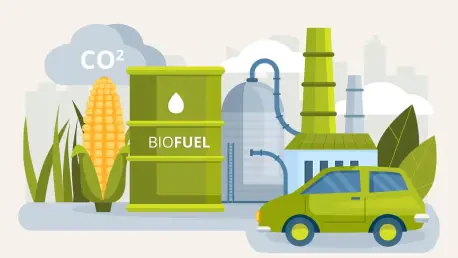What if one day, American agriculture could thrive without the environmental toll of conventional farming methods? The concept may seem distant, yet as the world grapples with climate change, such a transformation becomes increasingly crucial. Agriculture’s contribution to greenhouse gas emissions necessitates innovative solutions, pressing scientists to explore unconventional pathways, including biofuel advancements.
Unveiling a Critical Dilemma
As climate change challenges loom larger, American agriculture stands at a crossroads. The sector’s significant carbon footprint necessitates urgent intervention to alleviate its contributions to environmental degradation. Nitrous oxide emissions from fertilizers present a major challenge. This greenhouse gas poses a climate impact exponentially greater than carbon dioxide, propelling an imperative need for emission reduction strategies in farming practices.
Addressing this environmental conundrum is not only about preserving natural resources but also ensuring the future sustainability of agriculture. With unpredictable climate change impacts, stakeholders, researchers, and policymakers must unite in formulating new agricultural paradigms. The choice between innovation and stagnation could dictate either the resilience or decline of American agriculture.
The Extensive Reach of Biofuel Impact
With aims to revolutionize agricultural practices, a U.S. Department of Energy biofuel research initiative emerged. Its focus? Diminishing the pervasive nitrous oxide emissions linked to synthetic fertilizers, a formidable environmental challenge. Fertilizer manufacturing and application processes both contribute significantly to emissions that compound climate change and water pollution issues.
The $38 million endeavor, forged with ambitious goals, sought to halve emissions from biofuel crops like corn and sorghum. The initiative also envisioned reducing the financial burden on farmers by curtailing fertilizer dependencies. Despite its promising blueprint, the project met an abrupt halt, leaving the scientific community in a state of uncertainty.
Decoding the Strategies for Transformation
Innovative methodologies approved within the endeavor featured prominently in the initiative’s strategy. Genetic modification stood at the forefront, empowering researchers to engineer crops requiring fewer nutrients while maintaining robust yields. Artificial intelligence applications added significant value, offering precise insights into crop genetics and optimizing fertilizer use.
Particularly notable was the research into corn at Colorado State University, highlighting crops potentially performing with half the conventional fertilizer input. The collaboration with Corteva aimed to leverage advanced genetics resources—contributing significantly to broader reductions in fertilizer reliance.
Insights from the Scientific Community
John McKay, a pivotal figure from Colorado State, voiced concerns about the project’s paused status. “The potential economic and environmental benefits are monumental,” he asserted, underscoring the urgency of resuming halted innovations. The freeze in funding raised apprehensions, as groundbreaking ideas languished without implementation.
In Kansas, communities experienced firsthand the repercussions of fertilizer pollution. Groundwater contamination led to costly water treatments, exemplifying the real-world implications of excessive fertilizer usage. These anecdotes underscored the necessity of actionable solutions drawn from the paused project’s vision.
A Vision for Sustainable Agriculture
The vision for sustainable American agriculture is multifaceted, emphasizing a gradual reduction in the prevalence of nitrogen-based fertilizers. Practical steps inspired by the halted project include enhancing crop genetics to necessitate less fertilizer and integrating biofuel research into mainstream agricultural practices.
Revisiting and revitalizing such projects could promise immense contributions toward mitigating environmental impacts. The journey toward sustainable agriculture awaits pioneers willing to blend innovation with tradition, enabling farming practices to evolve in harmony with nature.
Innovative biofuel research offers a beacon of hope for transforming American agriculture. The potential to reduce environmental impacts and cut costs accentuates the urgency for reenvisioning stalled initiatives. Future agriculture lies within reach—awaiting proactive steps toward sustainable solutions, prioritizing environmental stewardship over historical practice. This visionary approach could herald an era of farming that honors both the earth and its cultivators, ensuring lasting prosperity for generations to come.









